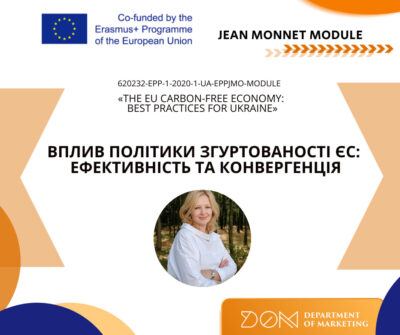The new academic year for bachelor’s in marketing began with new seminars within the framework of Jean Monnet’s project “Carbon Neutral Economy: Best Practices for Ukraine” (620232-EPP-1-2020-1-UA-EPPJMO-MODULE).
Chygryn Olena held a seminar on “The Impact of EU Cohesion Policy”, in which she told about various aspects of the implementation of EU cohesion policy: efficiency, convergence, inequality, governance and many others.
It was especially useful to study the experience of the individual (France, Greece, Romania) European countries in order to identify causal links between cohesion policy and economic growth.
The participants of the discussion tried to answer the question: have the programs implemented by the regions achieved their targets? what are they for? what did they achieve to meet the needs of the regions?
Students were interested in the experience of France in the project “Regional Development Program – Burgundy” in which sustainable and inclusive growth measures were implemented.
Greece’s experience in promoting social cohesion was examined on the example of the Human Resources Education and Lifelong Learning Program, which aimed to reduce unemployment, create new opportunities for quality education, improve skills and provide sustainable employment for all.
In the example of Romania, the “Large Infrastructure Operational Program (LIOP)” was considered, the main purpose of which was to promote sustainable economic growth and safe and efficient use of natural resources. The implementation of the project solves the development problems identified at the national level in terms of transport infrastructure, development of sustainable urban transport, environmental protection and the introduction of green energy.
According to the results of the lecture discussion, the students summarized the main issues of sustainable and inclusive development of the Sumy region.








